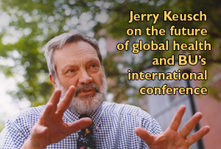Jerry Keusch on the future of global health and BU’s international conference

Bernard Kouchner, M.D., a cofounder of Doctors Without Borders and a former French minister of health, is one of several global health experts who will speak today, November 16, at the 4 p.m. plenary session of Global Health — A Bridge to the Future, the four-day inaugural conference of the Global Health Initiative at Boston University (GHI).
The session will be introduced by President Robert Brown. Held at Metcalf Hall, George Sherman Union, 775 Commonwealth Ave., the session is open to the public. The entire conference will be webcast at www.bu.edu/ghi.
Gerald T. Keusch, GHI director and Medical Campus assistant provost for global health, talks to BU Today about the conference and his hopes for this new University initiative.
Q: What is the global health conference about, and who is attending?
This conference has assembled 75 leaders and practitioners from around the world who are active in public health, health science and policy, the social sciences, and the arts to consider how critical public health issues will evolve over the next 50 years. Our aim is to bring together individuals who are at the forefront of vital current-day health initiatives and have them step back, together, from the pressing issues of today to look toward the long-range horizon of public health. We want to ask, where do we want to be in 2050, and what do we need to do to get there? One third of the participants here this week are from the United States, one third are from elsewhere in the developed world, and one third are from the developing world in Africa, Asia, and Latin America. We are proud to have worked closely with the Frederick S. Pardee Center for the Study of the Longer Range Future in organizing this meeting.
Q: This is quite a diverse group, internationally and in areas of expertise. What kinds of topics will be discussed?
Our opening session today will consider the questions, what does health really mean? What will it mean in 2050? I encourage students and faculty to attend this session to hear people such as Bernard Kouchner and Solomon Benatar [former head of medicine at Groote Schur Hospital in Cape Town, South Africa, where the world’s first heart transplant was performed, and founding director of the Bioethics Center, University of Cape Town]. They, and the other speakers, will bring fascinating perspectives to these questions. During subsequent working sessions this week, participants will think about the relationship of health to creativity and identity, consider the impact of urbanization and the development of megacities, and examine whether our national and international institutions that address health are up to the task or whether we need to invent new ones.
Q: What do you hope to accomplish with this event?
All our efforts are aimed at reducing health disparities and improving health and happiness among the world’s population, and we are focused on the most vulnerable in developing countries. We are taking a longer-term perspective here and addressing big issues and not individual diseases. By the final session, we hope to have gained enough insight that we will be able to summarize what we’ve heard over the four days and then map out an action agenda. Within a year’s time, we intend to publish a book. That book will take a hard look at the things that were discussed and the insights that emerged and review the adequacy of the recommendations for action steps for research, implementation of new programs, and institutional reform.
Q: What is the Global Health Initiative at BU, and what does it plan to accomplish?
机汇
Q: How can people learn more about the GHI?
For starters, they can attend today’s session at 4 p.m. in Metcalf Hall. They can also visit our Web site at www.bu.edu/ghi. And they can join us tomorrow night at 7 p.m. in the Tsai Performance Center for a screening of the South African film Yesterday. This film is about a woman in KwaZulu-Natal who learns she is HIV-infected. The film’s director, Anant Singh, will introduce the film and respond to questions afterwards. This is an opportunity to see how the arts and health issues come together to present a deep message in a beautiful film.